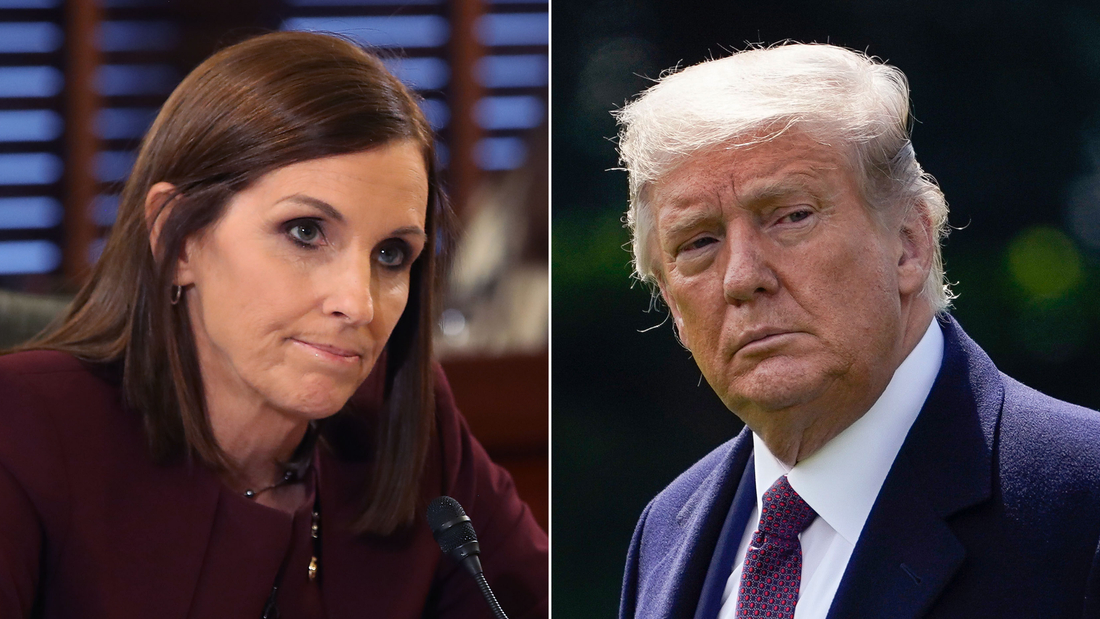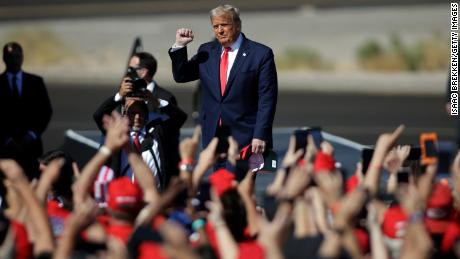As he logs thousands of miles crisscrossing the country in search of electoral votes, Trump has made it clear that he views his own race as the sole priority
The Maine Republican, who has built her political brand on being an independent voice, was silent in the immediate aftermath, even as other Republicans who aren’t up for reelection this year issued statements critical of the President’s decision — and earned Trump’s very public wrath.
After four days had passed, and as the news cycle moved on, Collins quietly sent a statement to the Bangor Daily News saying the President shouldn’t have offered Stone clemency, hoping to distance herself from Trump without landing on his radar. It seemed to go unnoticed by the President.
Yet three months later, the balancing act was fraying. After catching wind of Collins’ decision to oppose his Supreme Court nominee on procedural grounds, Trump lashed out.
“Not worth the work!” an exasperated Trump tweeted. When he visited an apple orchard in Maine last week in search of an electoral vote, Collins was nowhere to be seen. Her name never arose.
As he logs thousands of miles crisscrossing the country in search of electoral votes, Trump has made clear he views his own race as the sole priority, giving short shrift to the vulnerable Republicans running underneath him while openly disparaging those who have crossed him.
As Republicans across the country walk on eggshells dealing with a President who demands unyielding loyalty despite a seemingly endless string of controversies, Trump is offering little accommodation for the political realities that will determine whether Republicans maintain control of the Senate next year.
He has taken few steps to allay the concerns of moderate voters, women or senior citizens who say his behavior is giving them reason to vote Democratic. Yet at the same time, he hasn’t allowed his bright presidential spotlight to shine on those who will require votes from his most ardent supporters.
“I think the Senate is tough, actually,” Trump said, acknowledging a grim political reality he has done little to improve. “The Senate is very tough.”
Speaking in Arizona on Wednesday, the President offered a mortifyingly dismissive introduction to the state’s vulnerable Republican senator, Martha McSally, even while declaring she was “respected by everybody.”
“Martha, just come up fast. Fast. Fast. Come on. Quick. You got one minute!” Trump said, rushing the senator onstage in the middle of his rally. “One minute, Martha! They don’t want to hear this, Martha. Come on. Let’s go. Quick, quick, quick. Come on. Let’s go.”
Polls have shown McSally facing a tough reelection battle. And as they have in other tighter-than-expected Senate races, Trump’s divisive behavior and rhetoric have been blamed for dragging down McSally’s prospects.
McSally herself has been forced to strike a balance; while she is still courting Trump supporters, as evidenced by her appearance at his rally this week, she refused to say whether she was proud of him during a recent Senate debate with her Democratic challenger, former astronaut Mark Kelly.
Divisive
Trump himself hasn’t been particularly helpful on either front. He continues to spout the divisive rhetoric that many voters — particularly women and seniors — say has turned them off, including during his rally in Goodyear, when he repeatedly disparaged his opponent as “Sleepy Joe.”
He also allowed for only the briefest of appeals to his die-hard fans from one of the Senate’s most vulnerable incumbents.
After allowing McSally only 60 seconds of his rally, Trump invited several out-of-state Republicans to speak without any prescribed time limits, including Sen. Rand Paul of Kentucky and House Republican leader Kevin McCarthy of California. And he granted some of his precious rally to Nigel Farage, the Brexit campaigner and ardent Trump supporter whose political ambitions in the UK have stalled.
Even letting McSally speak was more than Trump has allowed at most of his rallies over the past weeks, where candidates are generally relegated to a pre-program before he arrives.
Visiting Omaha on Tuesday in search of a single electoral vote in Nebraska’s 2nd District, Trump made his appeals as much about closely neighboring Iowa as he did about Nebraska. Many in the crowd had crossed over the border to watch Trump speak — including Sen. Joni Ernst, who is also locked in a closer-than-expected race for reelection.
Ernst in recent weeks has refused to answer questions from reporters in the Capitol about the President, including ignoring CNN when asked if she had confidence in Dr. Anthony Fauci after Trump called the leading infectious disease expert a “disaster.” She continued walking without uttering a word.
In August, when asked if Trump should be saying the virus was simply going to disappear, Ernst told CNN: “I think we should continue wearing our masks and doing all the social distancing in the meantime.”
Yet at his rally in Omaha — where mask-wearing was infrequent and social-distancing impossible — there was Ernst, standing in the front row and waving enthusiastically as Trump called her out from the stage and detailed how often she telephoned him asking for something.
“Where’s Joni? Joni. Joni,” Trump said. “They call, ‘Sir, we need help with ethanol. Sir, we need help with corn. We need … ‘ It’s always — but you know what? That’s what a great senator.”
That was at least a more favorable description than was offered for Sen. Ben Sasse, the Nebraska Republican up for reelection this year, whose seat is considered safe. Earlier this month, Sasse told constituents on a conference call that Trump’s “stupid political obsessions” could jeopardize Republican control of the Senate.
Predictably, Sasse wasn’t present for Trump’s stop in Nebraska. But his Republican colleague, Sen. Deb Fischer, was.
“She is my favorite senator from the state of Nebraska. By far, by far,” Trump said, going on to describe Fischer’s own persistent phone calls. “I’ll tell you what, she calls me, it doesn’t stop.”
On his side
But while Trump had once told advisers he wanted to host a rally in South Carolina in the closing stretch of the campaign, no appearance in the state is expected before Election Day since the state is considered reliably safe for Trump’s own purposes. Vice President Mike Pence did visit Greenville alongside Graham on Tuesday.
Trump, visiting Gastonia, North Carolina, last week, seemed more concerned with his own chances than with how Tillis might fare.
“It’s going to be a tough race, but our race doesn’t look like it’s going to be as close. Our race looks like it’s going for the win,” he said.
In Georgia, where two Senate races are underway, Trump’s unpopularity among White college-educated voters has caused problems for Republican candidates down the ballot. One of them, Sen. Kelly Loeffler, had been running on her close alliance with Trump and described herself as “more conservative than Attila the Hun” in a television ad. But this week she proclaimed to be “not familiar” with Trump’s infamous caught-on-camera comments about assaulting women that surfaced during the 2016 election.
Loeffler, who was appointed to the seat last year, is running in a special election to serve the rest of the term. She faces Republican Rep. Doug Collins and the Rev. Raphael Warnock, a Democrat, among other candidates, who will all appear on the same ballot. If no one surpasses 50% of the vote, the race will turn to a two-person runoff election in January.
Trump has declined to endorse either of the leading Republicans in the race, which could have consolidated support for one or the other. In private, Senate Majority Leader Mitch McConnell had counseled Trump to ensure the party would unite behind one candidate and avoid a messy internecine battle that could imperil the crucial seat, multiple GOP sources told CNN.
Instead, appearing in Macon last week, Trump said having both of them on the ballot was better for him.
“They’re both going to the polls. They’re going to bring their people with them. And you know that the biggest winner is going to be Trump,” he said. “Because everybody that votes for both of them is going to vote for me.”
![]()






